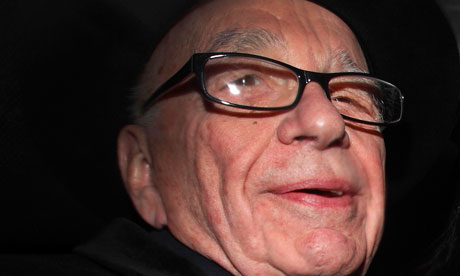Media mogul contrived to sound rather likeable, his dry, self-deprecating humour far from standard tycoon pomposity
News Corp chief Rupert Murdoch drives away from the High Court in after giving evidence at the Leveson Inquiry. Photograph: Justin Tallis/Getty
Rupert Murdoch showed just how ruthless he can be at Lord Justice Leveson's inquiry. In one of the tighter corners of his corner-cutting career the media mogul repeatedly insisted that he enjoys little political influence, let alone charismatic authority over prime ministers or underlings. As for trading his papers' support at elections in return for commercial gain, the very thought is repugnant to him.
Actually, the performance was even more ruthless than that. Time and time again during a crafty three and a half hours in the witness box at the High Court in London, Murdoch contrived to sound rather likeable, his dry, self-deprecating humour far from standard tycoon pomposity. The court laughed a lot, more with him than at him most of the time, as in "Don't take my tweets too seriously."
Press barons should expect their privacy to be invaded like other important people, Murdoch conceded, something the secretive Barclays brothers would only say under torture. When reminded that he'd reportedly given the Sun's Kelvin McKenzie "a helluva bollocking", he said yes, he had given him a helluva bollocking - for that "Sun Wot won It" headline in 1992. "It was tasteless and wrong … we don't have that sort of power."
Whatever Leveson and Robert Jay QC, lead counsel to the phone hacking inquiry, made of their star witness's mojo, they are keeping it to themselves for now. Being pretty unflamboyant themselves both appeared unfazed in the presence of a $60 billion company man with a $34 billion ("Yeah, approximately,") turnover. If Murdoch had arrived with a bevy of Page 3 girls on his arm Leveson would have expressed only polite surprise.
In the event he came with No 2 son Lachlan (manly hugs), his wife, Wendi Murdoch (thumbs up) and assorted minders to deal with any pie-throwers Wendi couldn't handle on her own. Unlike No 2 son, James, on Monday, he swore the oath "by Almighty God." it gave rise to immediate speculation that Rupert has cut a divine deal whereby God gets a free sub to Sky Sport and great publicity in return for a free hand with the Heavenly Times.
That sort of snide remark is just what Murdoch had flown into London to repudiate. "I want to put certain myths to bed," he said ("Digger Puts Miss to Bed," in Sun-speak), so that reporters lost count of how many times he told Jay " I have never asked a prime minister for anything." Without quite claiming he had been the victim of extraordinary rendition he clearly wanted to give the impression that tiresome politicians were always pestering him but that he is very hard to impress.
Would that apply to the private dinner you asked Margaret Thatcher to give you at Chequers during his Times/Sunday Times purchase in 1981? asked Jay, who has done his homework. Much given to ten second pauses Murdoch just chuckled. He'd just explained the bid: no express favours sought or given.
It went on like this through the Thatcher, Major, Blair, Brown and Cameron years. They all wanted to impress him and he was kind about most of them. Yet here he was saying he didn't have any weapons of mass destruction to deploy against them, only a genuine curiosity about people and ideas (democracy too, he regards his chats as part of the process). He keeps it quite separate from business.
Gob-smacking or what, because Jay's trawl through the political memoirs had produced some awkward testimony from ex-editors like Andrew Neil and Harry Evans, ex-PMs and apparatchiks like Alastair Campbell, all paying tribute to Rupert's influence trading talents. Like most witnesses Murdoch's memory is selective. He muddles policies and elections, either can't remember a meeting or can only remember what he didn't say: he didn't seek favours. Yet, Aussie ex-PM, Paul Keating, caught it well. "You can do a deal with him without ever saying a deal was done," Jay recalled him saying.
But in the process of denial Murdoch had to trash a lot of people. Keating: "Extravagant language." Jonathan Aitken: "Oh, well …". The economist Irwin Stelzer: just a friend, not his guru. Gossipy diarist Woodrow Wyatt: a good host but prone to exaggerate his closeness to Thatcher ("Don't put too much weight on what he said"). Was Wyatt's claim true he'd cried "that's me" at a Cliveden party in 1987 when Labour complained of "lies and smears" in the media]? " If i said that it was the influence of alcohol." Laughter in court.
It was outrageous, of course. At one point he said "I take particular pride in the fact that we have never pushed our commercial interests in our papers." BBC-bashing? Sky Sport promoting? Fox movies? A smart child of 10 could expose that hollow claim. At another point he denied always backing the winning side, let alone to promote his commercial interests; if he did surely he'd always back the Tories.
It was disingenuous, but sincerely so. Faced with the prospect of having to come back he was overheard at the lunch break saying "Let's force them to get this fucking thing over this afternoon." In the circumstances Leveson and Jay could hardly oblige, could they? "I don't think I have an aura," Murdoch had told them. So they took him at his word.
http://www.guardian.co.uk/media/2012/apr/25/leveson-inquiry-rupert-murdoch?CMP=twt_fd

